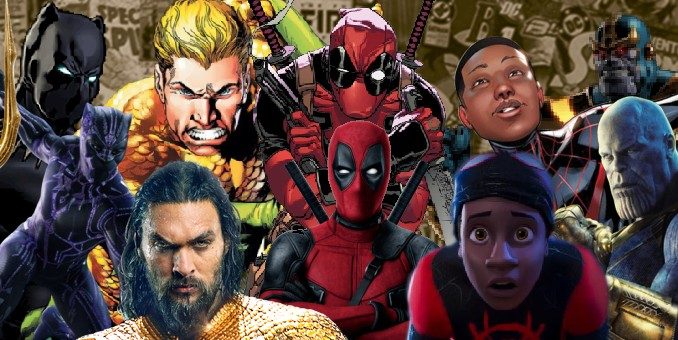
Finally, what does “Excelsior” mean? “Upward and onward to greater glory!” That’s what I wish you whenever I finish tweeting! Excelsior!
— stan lee (@TheRealStanLee) November 9, 2010
2018 was the year we lost Stan Lee. His passing was one that we saw coming (his declining health was captured on photo ops across the country) but still shocked and saddened us. So, as a tribute to Stan the Man, the man who had a hand in creating the characters who make up the Marvel Cinematic Universe, we’ll cop his catch phrase to describe this year in comic book films. Because this was the year comic book films reached upward and onward to greater glory.
 If you asked any movie pundit at the beginning of 2018 what will be the highest grossing comic book film of the year, the film that had a chance of being a highest domestic-grossing comic book film of all time and the highest grossing picture of the year, those pundits would choose Avengers: Infinity War. We now know that these pundits would have been wrong. That film would have be Black Panther.
If you asked any movie pundit at the beginning of 2018 what will be the highest grossing comic book film of the year, the film that had a chance of being a highest domestic-grossing comic book film of all time and the highest grossing picture of the year, those pundits would choose Avengers: Infinity War. We now know that these pundits would have been wrong. That film would have be Black Panther.
Black Panther and its success crated a new paradigm in comic book films. Films with predominantly black casts weren’t supposed to do well at the box office. Black films don’t do well overseas. First outings by solo heroes don’t make that much money. Black Panther proved all that conventional wisdom wrong. It made over $700 million in the U.S., another $646 million overseas and became one of the MCU’s biggest hits of all time.
The film also provided the blueprint for the next stage of Marvel Studios. The first era was coming to an end with the third and fourth Avengers films, leaving behind an uncertain future. Black Panther showed that there are untapped audiences out there looking for super hero representation on the big screen. That should play out well for Captain Marvel and the in-development Shang-Chi film. It also proved that the super hero didn’t need to live in the U.S. in order to make bank, which led credibility to the rumor that Marvel has a Captain Britain film in development. But most of all, it proved that Marvel Studios will be in fine shape after the events of the final Avengers films.

Speaking of those Avengers film, this brings us to Avengers: Infinity War. Marvel promised the film would be a stand alone film, but as we all knew that it would be the first of two. The film took the bold move of [SPOILER WARNING] killing off half its heroes. The cynical comic book fans, who have seen their favorite heroes die and comeback and then die and comeback again, know the heroes are coming back, someway, somehow. However, having the villain win caused an enormous buzz and huge curiosity for what will come next.

Marvel Studios did have a third film out this year–Ant-Man and Wasp. This franchise seems to have fallen into a place of where it is a an entertaining yet forgettable film that comes out every few years. This film was a pleasant diversion, a good film, but not one that really sticks without for very long after you leave the theater. That might be a problem, because I think the “quantum realm,” which has been a recurring element in the Ant-Man films, will play a big role in the future of the Marvel Cinematic Universe.

2018 was also the year when many comic fans got what they had wanted for a long time. It was the year that Disney would buy Fox’s assets, returning the Fantastic Four and Marvel’s mutant characters back into the fold. It might be a year or two before we see what Marvel Studios will do with the characters, but fans have something to look forward to.
In the meantime, we get to see the waning Marvel offerings from Fox. This year offers us Deadpool 2, and it might be the last R-Rated Marvel film.
Obviously, it wasn’t intended to be. There was a lot of table-setting in this film, with the introduction of Cable and Domino. It would seem that the film was setting up the in-development X-Force movie. Whether or not we’ll ever see that film or if we do what form it will take remains to be seen. But Fox was able to get a little bit more money out of the franchise regardless.

Once Upon a Deadpool was released just a few weeks ago. It was a recut of Deadpool 2 so it could garner a PG-13 rating. Yes, Fox took Deadpool. which almost every single piece of press claimed was a character that could only be captured in an R-Rated film, released a PG-13 film with the character to get an extra $5 million into the gross.
It is fascinating to think of the motivation behind this move. Was it just the simple cash grab it appeared to be? Was it a trial balloon for bringing the character over to Disney and their more family friendly rating? Was it because they felt that they could earn more money for Fuck Cancer by donating $1 for every ticket sold to the censored rerelease than just doing a flat donation? Or just trying to reach a younger audience that normally be allowed to see a Deadpool movie to expand its customer base?
Whatever the reason or reasons, Once Upon a Deadpool was a betrayal of the anarchic spirit that separated the franchise from every other comic book movie. Deadpool wore its R-Rating like a badge of honor, which make putting out a PG-13 version a kind of emasculation.

Sony, the other studio who holds Marvel rights, also put out a few movies this year, one that seems to be the opposite of the other.
Venom looked awful from the first teaser trailer. The critics pretty much confirmed that assessment, giving the film a 28% fresh rating at Rotten Tomatoes. It looked like the Titanic heading towards the iceberg. There was no way that Venom would be a hit.
But whoever the Dark Gods were that gave Venom his inexplicable popularity are still working for the black gooey guy, because the film opened big and kept on earning. It has earned $855 million worldwide. A film that looked dead on arrival is in a good place to start a successful franchise with. It boggles the mind.

And then they put out Spider-Man: Into the Spider-Verse. The trailers looked fantastic. The buzz surrounding the film was amazing. The reviews come out and are spectacular–97% Fresh on Rotten Tomatoes.
The final product more than led up to the hype. The film not only was the best comic book ever, not only the best animated films ever, but one of the best films ever. It is a film made with such imagination and creativity that it is an impressive feat of film making. It pushes boundaries and propels the medium of film into the future and sets an incredibly high bar for future filmmakers. That might sound like hyperbole, but all of that is true. If you haven’t seen it, see it. Now.
The film opens at $35.4 million, $45 million less than Venom‘s opening (while being the biggest December animated of all time). As of this writing, it has made around 150% of its budget back. It’s incredible word of mouth might give it enough legs to become a hit, but not one quite as large enough to surpass Venom.
And that’s a shame. In a perfect world, Spider-Man: Into the Spider-Verse would be a blockbuster and Venom would be barely scraping by as a hit. But Into the Spider-Verse will gain a victory by inspiring generations of filmmakers with its brilliance, which is nice.

Last, but not least (for a change) is Warner Brothers’ offerings. First, Aquaman. It has been a tumultuous year for Warner Brothers/ DC Films. In the aftermath of the failure of Justice League, heads started to roll, starting back in January with Jon Berg being replaced by Walter Hamada as DC Film president and continuing to DC Entertainment’s Diane Nelson’s retirement in June and Geoff Johns stepping down as DC Entertainment’s Chief Creative Officer and president of DC Films.
So, needless to say, Warners needs a win. And it got one of sorts with Aquaman. It wasn’t a hands down win like Wonder Woman, but it was big improvement over Justice League and Batman v. Superman. It was good, mindless fun, if somewhat uneven film. However, it was a good step in the right direction for the DCEU, if Warners wants to keep that going.

Warners also put out another DC adaptation that might have flown under a lot of people’s radar: Teen Titans Go! To The Movies. The big screen adaptation of the Cartoon Network show arrived in July and was one of the best DC offerings Warners had ever put out. While the film had a lot of goofy fun for the kids, it offered a surprising amount of biting satire for the adults. While it’s $52 million worldwide grosses might make it seem like a flop, it was made for an economical $10 million budget, which would make the film a sizable hit no matter how thin you slice it.
As for what the future of the comic book film holds, well, that’s in flux. Warners has two DC films coming next year, Shazam! and Joker, and a Vertigo adaptation, The Kitchen. After that, who knows? It does have a two films scheduled for 2020–the Birds of Prey film in February and Wonder Woman 1984 in June. But it also has two other spots reserved for a DC film in 2020, one in April and one in July, which might never be filled but after that it has nothing set in stone.
Marvel is just as mysterious. Next year’s calendar features Captain Marvel in March, Avengers: Endgame in April, and its partnership with Sony on Spider-Man: Far From Home in July. Marvel Studios has plenty of spots reserved in the next few years–2 in 2020, 3 in 2021, and 3 in 2022– but no films attached to them. You get the feeling that Disney will be attaching names to those spots sometime after Avengers: Endgame, but what would they be? Black Panther 2? Doctor Strange 2? Will Guardians of the Galaxy 3 finally get made? Will Black Widow be announced? Or, dare we dream, a Fantastic Four or X-Men film?
Fox will wrap up its Marvel commitment with Dark Phoenix in June and New Mutants in August. The will also present us another installment of the Kingsman franchise in November. And in April, Lionsgate will bring us the Hellboy reboot.
From there, I hope the studios bring a fresh outlook and diverse heroes to its future line up. If the build on what this year had to offer, there is no limit as to where they can go.




